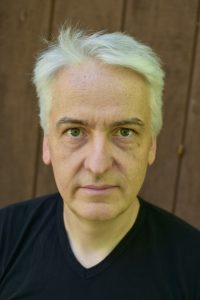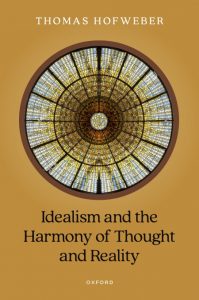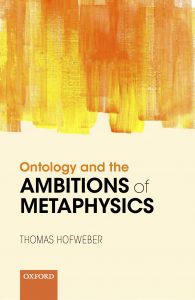I am a professor of philosophy (primary) and of data science (secondary) at the University of North Carolina at Chapel Hill. More officially, I am the William R. Kenan Jr. Distinguished Professor, which sounds fancy, and it actually is. I work mostly in metaphysics, the philosophy of language, the philosophy of mathematics, and the foundations of artificial intelligence.
More officially, I am the William R. Kenan Jr. Distinguished Professor, which sounds fancy, and it actually is. I work mostly in metaphysics, the philosophy of language, the philosophy of mathematics, and the foundations of artificial intelligence.
Here is my CV.
I am presently working on four projects:
1. A project on the philosophy of logic, concerning the place of logic in various philosophical disciplines, in particular the philosophy of mathematics, the philosophy of language, and metaphysics.
2. A project on human extinction, in particular concerning what humanity should do to prepare for its own extinction.
3. A group of projects on foundational issues about artificial intelligence, covering topics tied to language models, financial forecasting models, machine learning in medicine, and others. Sample issues are what language models represent about the world, what they ultimately model, whether the models are subject to the norms of rationality, in particular, coherence norms, interpreting machine learning models, adversarial examples to financial forecasting models, ethical issues tied to the use of AI in medicine, and a few other ones.
4. Immanent metaphysics: I am pursuing the project of immanent metaphysics, presented in Idealism and the Harmony of Thought and Reality (OUP 2023), in particular for the case of agency, number, and various concepts tied to that-clauses.
I am the director of the AI Project here at UNC and the main organizer of the Idealism Network.
Over the last few years I have been working on idealism, in particular a defense of a strong version of idealism, which holds that not just minds in general, but our human minds in particular, are metaphysically central to reality as a whole. This view is defended in some detail in my book
Idealism and the Harmony of Thought and Reality (Oxford University Press 2023) (amazon, OUP).

The official abstract is as follows:
Do human beings have a special and distinguished place in reality? In Idealism and the Harmony of Thought and Reality Thomas Hofweber contends that they do. We are special since there is an intimate connection between our human minds and reality itself. This book defends a form of idealism which holds that our human minds constrain, but do not construct, reality as the totality of facts. Reality as the totality of facts is thus not independent of our minds, and our minds play a metaphysically special role in all of reality. But reality as the totality of things is taken to be completely independent of us.
Hofweber’s proposed form of conceptual idealism is formulated via the notion of a harmony between our minds and reality. This harmony is defended through considerations in the philosophy of language. How can one possibly defend a metaphysical thesis like idealism from considerations about our own representation? A key step in the book’s argument is to consider a special class of concepts—inescapable concepts—which we cannot rationally replace with different ones. This leads to a new approach for making progress in metaphysics—immanent metaphysics—which is broadly neo-Kantian in spirit.
A more detailed table of contents is here: Idealism and the Harmony of Thought and Reality
This defense of idealism is tied to a larger approach to metaphysics, immanent metaphysics, and a particular view of the relationship between metaphysics, epistemology and the philosophy of language, all of which are spelled out in the idealism book.
I have also done recent work in the philosophy of logic, the philosophy of language, and metaphysics. See just below or my papers page for some recent articles.
My main project before the ones mentioned above concerned the place of ontological questions in various metaphysical debates. The overall view is spelled out in several papers, and especially in my book:
Ontology and the Ambitions of Metaphysics (Oxford University Press 2016) (amazon, OUP).
The official abstract for this book is as follows:
Many significant problems in metaphysics are tied to ontological questions, but ontology and its relation to larger questions in metaphysics give rise to a series of puzzles that suggest that we don’t fully understand what ontology is supposed to do, nor what ambitions metaphysics can have for finding out about what the world is like. Thomas Hofweber aims to solve these puzzles about ontology and consequently to make progress on four central metaphysical problems: the philosophy of arithmetic, the metaphysics of ordinary objects, the problem of universals, and the question whether reality is independent of us. Crucial parts of the proposed solution include considerations about quantification and its relationship to ontology, the place of reference in natural languages, the possibility of ineffable facts, the extent of empirical evidence in metaphysics, and whether metaphysics can properly be esoteric.
Overall, Hofweber defends a rationalist account of arithmetic, an empiricist picture in the philosophy of ordinary objects, a restricted from of nominalism, and realism about reality, understood as all there is, but idealism about reality, understood as all that is the case. He defends metaphysics as having some questions of fact that are distinctly its own, with a limited form of autonomy from other parts of inquiry, but rejects several metaphysical projects and approaches as being based on a mistake.
Reviewed in The Journal of Philosophy, Philosophical Quarterly, Philosophical Review, Review of Metaphysics, and Zeitschrift für philosophische Forschung.
A book symposium on this book appeared in Philosophy and Phenomenological Research with contributions by Karen Bennett, Agustín Rayo, and Thomas Sattig.
Another book symposium with contributions by Matti Eklund and Gabriel Uzquiano appeared in Analysis.
Recent articles:
- “Are language models rational? The case of coherence norms and belief revision” by Thomas Hofweber, Peter Hase, Elias Stengel-Eskin, Mohit Bansal, arXiv preprint. arXiv:2406.03442
- “Fundamental Problems With Model Editing: How Should Rational Belief Revision Work in LLMs?” by Peter Hase, Thomas Hofweber, Xiang Zhou, Elias Stengel-Eskin, Mohit Bansal. arXiv preprint. arXiv:2406.19354 Forthcoming in Transactions on Machine Learning Research (TMLR)
- “Machine Learning in Healthcare: Ethical considerations tied to privacy, interpretability, and bias” (with Rebecca Walker) North Carolina Journal of Medicine. Vol. 85, issue 4, July 2024.
- “Refocusing Frege’s other Puzzle: a response to Snyder, Samuels, and Shapiro” Philosophia Mathematica. 2023
- “The linguistic argument for idealism, but not for linguistic idealism”
forthcoming in an OUP volume on linguistic idealism, R. Gaskin (ed.)more on this shortly…. - “The case against higher-order metaphysics” in Metaphysics 2022
- “Inescapable concepts” in the Australasian Journal of Philosophy 2022
- “Thomasson on easy arguments” forthcoming in a volume on Amie Thomasson, M. Garcia (ed.)
- “The unrevisability of logic” in Philosophical Perspectives 2021
- “The place of the philosophy of language in metaphysics” forthcoming in Oxford Studies in the Philosophy of Language. 2022.
- “Fundamental ontology and esoteric metaphysics: how to settle the question”
Forthcoming in J. Cumpa (ed.) The Question of Ontology. Oxford University Press. 2021 2022 2023Volume Canceled (!!) - “Why natural language is the ideal language for metaphysics” in The Language of Ontology. J. Miller (ed.) Oxford University Press. Pages 88-101. 2021
- “Fragmentalism and special relativity” (with Marc Lange). theorema vol.39.3, pages 5-15. 2020.
- “Is metaphysics special?” In the Routledge Handbook of Metametaphysics. R. Bliss and J. Miller (eds.). Pages 421-431. 2020.
- “Idealism and the harmony of thought and reality” in Mind 2019
- “Review of Karen Bennett’s Making Things Up” in The Philosophical Review 2019
- “Conceptual idealism without ontological idealism: why idealism is true after all” in Idealism: new essays in metaphysics (OUP 2018) T. Goldschmidt and K. Pearce (Eds).
- “Empirical evidence and the metaphysics of ordinary objects” in The Nature of Ordinary Objects. J. Cumpa and B. Brewer (eds.). Cambridge University Press. 2018.
- “Are there ineffable aspects of reality?” in Oxford Studies in Metaphysics (2017).
- “Fine’s fragmentalist interpretation of special relativity” (with Marc Lange) in Nous (2016).
- “Intellectual humility and the limits of conceptual representation” Res Philosophica (2016)
- “Carnap’s Big Idea” in Ontology after Carnap, Blatti and LaPointe (eds.) OUP (2016)
- “Hyperreal-valued probability measures approximating a real-valued measure” (with Ralf Schindler) in the Notre Dame Journal of Formal Logic (2016).
- “The place of subjects in the metaphysics of material objects” dialectica (2015).
- “Cardinality arguments against regular probability measures” Thought (2014)
- “Infinitesimal Chances” Philosophers’ Imprint (2014).
For (almost) all of my papers, see my PAPERS page.
Present teaching
This semester (Fall 2024) I am teaching a graduate seminar on philosophical questions about AI. Last semester (Spring 2024) I taught a large lecture course entitled AI and the Future of Humanity
